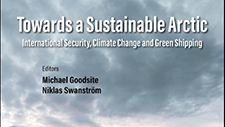
Niklas Swanström
Executive Director
Twitter: niklasswanstrom LinkedIn: niklasswanstrom ResearchGate: Niklas Swanström
Dr. Niklas Swanström is the Director of the Institute for Security and Development Policy, and one of its co-founders. He is a Fellow at the Foreign Policy Institute of the Paul H. Nitze School of Advanced International Studies (SAIS) and a Senior Associate Research Fellow at the Italian Institute for International Political Studies (ISPI). His main areas of expertise are conflict prevention, conflict management and regional cooperation; Chinese foreign policy and security in Northeast Asia; the Belt and Road Initiative, traditional and non-traditional security threats and its effect on regional and national security as well as negotiations. His focus is mainly on Northeast Asia, Central Asia and Southeast Asia.
Dr. Swanström has authored, co-authored or edited a number of books, including: Eurasia’s ascent in Energy and geopolitics, Sino-Japanese Relations: The need for Conflict Prevention and Management, Transnationell brottslighet: ett säkerhetshot? (Trans-national Crime: A security Threat?), Regional Cooperation and Conflict Management: Lessons from the Pacific Rim and Foreign Devils, Dictatorship or Institutional Control: China ‘s foreign policy towards Southeast Asia.
Dr. Swanström holds a Ph.D. in Peace and Conflict Studies from Uppsala University. His dissertation dealt with regional cooperation and conflict management in the Pacific Rim. He also holds a Licentiate degree from the Department of Peace and Conflict research that examined the Chinese foreign policy towards Southeast Asia. He holds MA degrees from Uppsala University and the Fletcher School of Law and Diplomacy. He has also been a student at Beijing Languages Institute, Beijing University and Dalian Languages University.
Ongoing Book Projects:
- East Asia Security Cooperation: Walk the Walk and Talk the Talk? with World Scientific
- U.S. and E.U., and the Emerging Supply Chain Network: Politics, Prospects, and Allies
Affiliations:
- Fellow at the Foreign Policy Institute of the Paul H. Nitze School of Advanced International Studies (SAIS)
- Senior Associate Research Fellow at the Italian Institute for International Political Studies (ISPI)
Teaching Engagements:
- “History of International Relations” at the University of Pavia
Publications by Niklas Swanström
-
IN DEFENSE OF THE LIBERAL INTERNATIONAL ORDER
In recent years, the geopolitical fight for global economic, diplomatic, and institutional control has acutely intensified, accentuating the crisis in the existing post-World War II Liberal International Order (LIO), championed […]
-
Georgia’s Foreign Policy and Its Alignment with the EU CSFP
For Georgia to become a member of the EU, it has an obligation to prove to Brussels that its economic and democratic institutions are stable. This is something that many […]
-
EU-Japan-Taiwan Cooperation: Building a Blue Supply Chain
The COVID-19 pandemic, the escalating trade war between the United States and China, and Russia’s invasion of Ukraine have exposed vulnerabilities and weaknesses in the global China-centric economic supply chain […]
-
European Economic Self-defense in the Face of Authoritarianism
Economic coercion by states has always been present in one form or the other, but the challenges have escalated to an unprecedented level in today’s globalized economy. Most notably, as […]
-
Towards a Sustainable Arctic: International Security, Climate Change and Green Shipping
The Arctic’s environment, economics, and politics are changing rapidly, and the conflicting interests among stakeholders mean that it lacks sustainable political and military cooperation. States bordering the Arctic — Russia, […]




